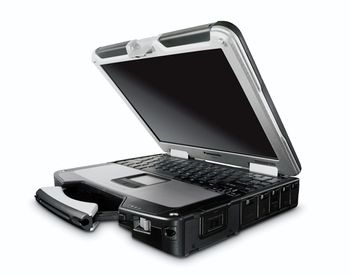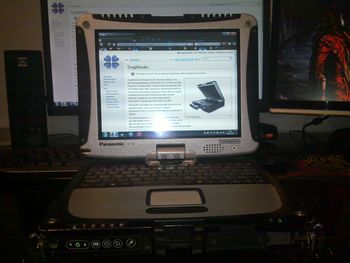We are still actively working on the spam issue.
Toughbooks
Toughbooks are Panasonic's line of tank-like laptops. They were first manufactured in 1996 with the CF-25, and as of today Panasonic still makes them. Current models are generally used in US military active duty, clumsy cops, and buisnesses who do "heavy work" (like painters/carpenters.) Where Macs are hipster Facebook machines and ThinkPads are virgin 4/8chan machines, Toughbooks are for the clumsy, autistic, "off-roaders", or people who work on the road often.
That means: long battery life, extremely bright screens that are sunlight readable, drop, dust and water resistance, hotswappable batteries and hard drives, passive cooling and lid catches.
Yes, they are expensive as FUCK. Yes, they last longer than any other laptop out there, they are built like a 80's Volvo, aka a tank. No, they are not blazing fast, especially the ULV models.
Contents
Acquiring Toughbooks
Password-locked BIOS
Ensure you don't buy a Toughbook with a password-locked BIOS! You CANNOT reset them in any way as you can with ThinkPads! Additionally, don't purchase Toughbooks that don't have a internal WLAN and/or WWAN card in it. They are Federal models 90% of the time which have the WLAN/WWAN slot BIOS restricted and you can't run a WLAN/WWAN card in one, they will not work.
If you DO get lucky and have a non-custom BIOS one like some 19 Mk4's, you can enable WLAN/WWAN with the right card(s), see here: http://archive.is/y8Y4I
A untested option for bios password removing is this: https://archive.is/6ttbQ (it's for ThinkPads but it might work too for TBs)
General Tips
Try not to buy from business sellers, they tend to ask a lot more than private sellers. Businesses usually get them in bulk for cheap, and think they can pull a kike move on you by selling a old as fuck one (i've seen CF-18's and 29's for 500$+, holy shit!) for WAY too much money.
Hard drive caddies for older models like the CF-18 and 29 are somewhat cheaper than newer ones for the CF-19 and 30/31. Caddies from all generations of CF-19's are interchangeable, as they are all SATA. The older ones are fully made from stainless steel and are held in place by two screws. From the 19 Mk6 on, Panasonic reverted to the old style caddy. The CF-30 and 31 caddies are also interchangable: https://archive.is/wPhWh
You can also use a CF-18 dock with a CF-19, the only difference with the VEB191 and VEB181 dock is that the PS/2 port has been removed and blanked off on the VEB191, electrically/aesthetically it's the same.
Older models, like the CF-18 and 29 tend to have broken/non working touchscreens because of delamination, the Mk1 CF-19 and CF-30 had this too sadly. With the Mk2 models it seems to be fixed however.
Port covers from China are shit, get original Panasonic ones if you want waterproofness, the Chinese ones don't keep out the water and you will ruin your Toughbook when you get caught in a rainstorm that way.
Same story with batteries, Chinese/clone batteries and chargers for Toughbooks are shit and should be avoided. Need a cheap charger? Use a IBM 72 watt adapter from a older ThinkPad, like a T40. They also have newer ones with a built in car/12v cigarette lighter socket cable. BE VERY CAREFUL NOT TO BUY A 19V ADAPTER! If you do plug a 19V adapter in, you WILL blow a fuse and make your TB a very expensive Magnesium door stopper!
Do not stare blindly on the maximum memory Panasonic describes for most models, a CF-19 Mk6 or 31 Mk3+ can use 32GB RAM theoretically, two 16GB DDR3 SO-DIMMs. And the 19 Mk2/3 for example can use 8GB RAM, but like 16GB DDR3 modules, 4GB DDR2 modules are extremely expensive. For a 19 Mk3 I'd up the ram to 4GB and run some Loonix distro like Zorin OS.
Most Toughbooks are limited to SATA2 so don't bother buying a extremely fast SSD.
Always, ALWAYS permanently disable CompuTrace! It's a botnet and your TB can get bricked by remote with it enabled. Plus it has numerous exploits and vulnerabilities, just like Intel's vPro. Newer Toughbooks also have Intel AT/Anti-Theft which is another botnet, disable it permanently.
As for buying: eBay, Craigslist, and if you like rulefaggots: Notebookreview's Panasonic forum, careful though: mention BIOS and password in one sentence and the mods/99% of the users there will sperg the fuck out and will probably ban you. Here's a example of the faggotry they are capable of: http://archive.is/CJmhy
Slightly better is Toughbooktalk, they allow BIOS password discussion. However, the owner doxed a user once (for selling overpriced shit, look up Black Hawk Toughbooks and prepare for apex kek, apparently if you mention him on TBT or NBR he spergs the fuck out lel), tread with caution.
Steam In-Home Streaming is a GREAT way to do vidya gaems on your CF-19, I can stream GTA V from my main laptop to my CF-19 without issues.
A good site for info about all sorts of rugged computers is http://www.ruggedpcreview.com, it's been here for a while and is still being updated.
To decode a modern Toughbook serial number, use this: http://www.panasonic.com/business/toughbook/order-toughbook-computers.asp
For older models, try the Toughwiki, a very useful source: http://toughwiki.com
Toughbooktalk's owner Rob has made a topic about intresting TB quirks, which I highly recommend reading: https://archive.is/kuSmD
Another thing about TBT: take some things they say with a grain of salt. They say dumb shit like "if you buy a TB from us you can guarantee it's okay!" which is partially bullshit, if you have some knowledge (which I assume all /g/ or /tech/ users have) of laptops you easily can get a Toughbook up and running.
The nicer thing about Toughbooks, however, is that normies don't have one ("it looks ugly as fuck!" -a comment the author of this article had about his 19 Mk6) and that you can laugh one square in the face if one drops his MacBook and it breaks.
Buyers Guide
So, you came to the conclusion you want a Toughbook? That's cool, solid choice, what model do you want?
Just want one to mess around with? CF-30 Mk2/3 or a CF-19 Mk2-3, these all have PAE, dual-core CPUs, SATA HDDs and 64 bit capability, and they can run Linux pretty good. The 19 and 30 Mk3 have LED backlights instead of CCFL's that won't dim over time. They also have a better in sunlight readable screen (CircuLumin coated LCD) and better battery life (due to LED backlight)
Don't bother with anything like the 18's or 29's, they don't support PAE until the Mk4+ models and neither have SATA HDDs.
Portability and battery life is a must? CF-19. It even can be swiveled into a tablet.
Have a need for speed? Any CF-31 with the i5 or a Mk6 CF-19, combine them with a desktop dock and you got a portable workstation. Don't bother buying a 19 Mk7 or Mk8, the CPU is 100 mhz faster in the Mk7 19 and in the 19 Mk8 the GPU is even slower than the Mk6!
Extreme portability and speed/Linux compatbility is a non-issue? CF-U1 Mk2, a rugged UMPC.
Wanna go maximum autism and have too much money? CF-31 Mk4 Performance Model with all factory integrated options.
Other guides can be found here and here.
A Brief History
1996: CF-25, first semi-rugged offering from the people in Osaka, Japan. Desgined to withstand 76cm drops, humidity and dust.
1999: CF-27, first fully-rugged Toughbook, first to offer a touchscreen and WWAN (Wide Wireless Area Network), IP53 water/dust rating.
2002: CF-28, first Toughbook to offer IP54 waterproof rating, and a sunlight readable transflective screen.
2003: CF-18, first Toughbook convertible tablet.
2006: CF-30, first Toughbook to have a 1000 nit screen, even more sunlight readable than anything else before.
2006: CF-19, first dual-core tablet Toughbook.
2010: CF-31, first Toughbook to offer dedicated graphics and active cooling.
Toughbook Jargon
Caddy: the case the HDD is kept in.
IP rating: Waterproofness and dust resistance, IP54 is for example dust resistant and splashing water resistant. IP65 is dust proof and low pressure water jet resistant.
Convertible tablet: A Toughbook (like the CF-19 or C2) which can be flipped into a tablet.
WWAN: Wireless Wide Area Network, mobile internet over 2G, 3G or 4G.
CCFL: Cold Cathode Fluorescent Lighting, fluorescent tubes as backlight. Not durable and tends to dim after a few years. LED screens are lightyears (pun unintended) ahead.

